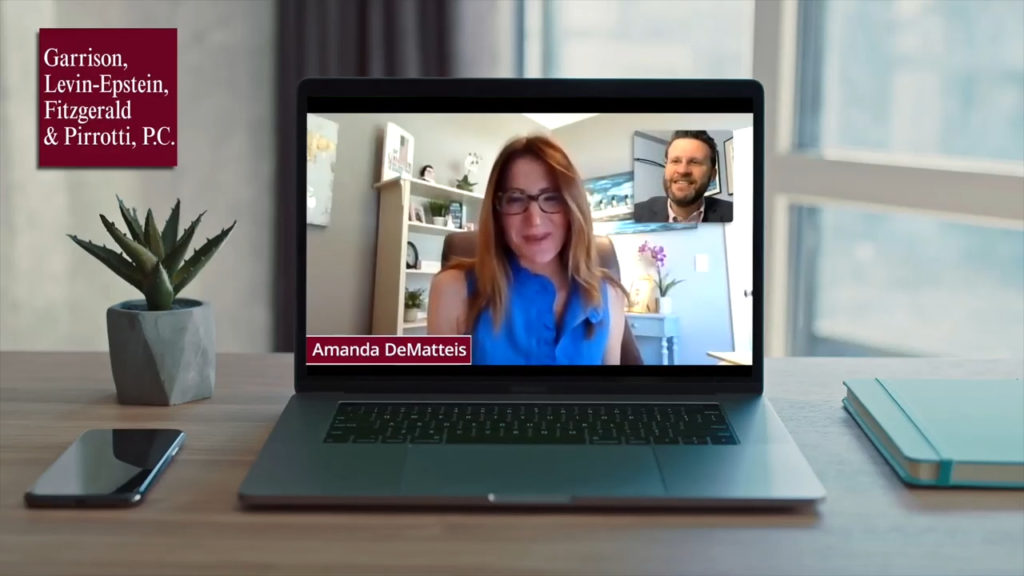May 17 2021
Josh Goodbaum: Hi, Amanda.
Amanda DeMatteis: Hi, Josh. What are we going to talk about today?
Goodbaum: I thought we could talk about how people find lawyers and in particular, employment lawyers. So, I’ve had two clients over the last couple of weeks who made me think about this question. One of them was a woman who already had a lawyer and she was looking to get a second opinion. She said to me, “Is my lawyer any good? Does my lawyer even do employment law?”
The second was a woman who came from me from the Hartford area. She lived in West Hartford, she worked in Hartford–she happened to be referred to me by a former client of mine or one of her friends or neighbors. And she said to me, “Well, don’t I need a lawyer in Hartford?” Right, so these two questions kind of go together. How does somebody find a lawyer, how do they know the lawyer is any good, and where does the lawyer need to be geographically located so that person can provide the maximum benefit to the client?
DeMatteis: Yeah, these are great questions and we get them all of the time. Let’s take one at a time. First, where does my lawyer need to be geographically? So, the most important thing to remember is any lawyer that you choose needs to be licensed to practice law wherever the incident took place. So if you’re a Hartford lawyer and this is Connecticut law or federal law, you want to make sure your lawyer is licensed to practice in those jurisdictions so that’s number one.
Goodbaum: Right, jurisdiction here being Connecticut.
DeMatteis: Connecticut, right.
Goodbaum: Right, so this is a thing that happens, lawyers are licensed on a state-by-state basis. There is no special license that comes from being in a particular city.
DeMatteis: Right, so whether you are in Hartford, New Haven, Fairfield, or anywhere else in between, up in the quiet corner, we won’t forget you guys either. No matter where you are, as long as a lawyer is licensed to practice law in Connecticut, that person can handle your case. So, don’t concentrate so much on geography. Concentrate much more on the substance of the lawyer. Who this person is, and whether or not they have a specialty in what we’re talking about, of course, is employment law. Just think reasonably–if you break your arm, you aren’t going to go to a cardiologist. So, if you have an employment law issue, you’re not going to go to a lawyer that specializes in family law, or tax, or something else. You want to stay specialized, so stick with an employment lawyer. Then the question, of course, is, how do you know if your employment lawyer is any good?
Goodbaum: Right, so, I’d start by looking at the lawyer’s website. What other kinds of cases have they done? Do they really have a volume and a record of experience in employment law representing employees? That’s what you’re looking for. Next is, be a consumer in this context. Right? If you were trying to buy I don’t know a book or a new gadget for your home–you’d probably read online reviews. Well, Google has reviews of lawyers. And you can read those. You might be able to find them in other places as well, but Google is a great place to aggregate reviews as it is for so many products.
And then the question is, what accolades does my potential lawyer have and does it make any difference? And there are a lot of accolades out there. I would say focus on the ones that can’t be bought. Some accolades lawyers can sign up for and pay some money, get a little certification and put it on their website. There are many that can’t be bought and those are the ones we take most seriously. So, Best Lawyers, Super Lawyers, US News and World Report, Martindale-Hubbell–these are agencies that rate and rank lawyers based on feedback from other lawyers and from judges. And you can’t pay any amount of money to get on those rankings.
DeMatteis: You can’t buy your way in.
Goodbaum: Right, you can’t buy your way in so those are the ones I’d be focused on. I would also be focused on recognitions from peer groups that again, can’t be bought–The American College of Trial Lawyers, The American Board of Trial Advocates, in the labor and employment content, The College of Labor and Employment Lawyers. And then, I’d be looking at as well–one thing I really don’t want to forget to mention–is for employment law specifically, you want to be looking for memberships in The National Employment Lawyers Association, and, if you’re in Connecticut, The Connecticut Employment Lawyers Association (CELA). These are lawyers who have dedicated their practice to doing employment law, representing Connecticut employees. Amanda happens to be the President of The Connecticut Employment Lawyers Association, two of our partners are former presidents of The Connecticut Employment Lawyers Association. I would expect that if you are looking for an employment lawyer, this person should be a member of CELA. So those are some good tips on how to try to find a lawyer if you’re a Connecticut employee, and regardless of where you live–if you live in Hartford, New Haven, you live in New London or up in Litchfield, it doesn’t matter, or Stamford–These are the ways you should think about how to find a lawyer.
DeMatteis: Sounds great. Always good talking with you, Josh.
Goodbaum: You too.
DeMatteis: We hope you learned something today. Check out our website for more. We’ll see you next time.
Goodbaum: Thanks, everybody.
Posted by Garrison, Levin-Epstein, Fitzgerald & Pirrotti, P.C. in Commentary
Tagged Amanda DeMatteis, Joshua Goodbaum








